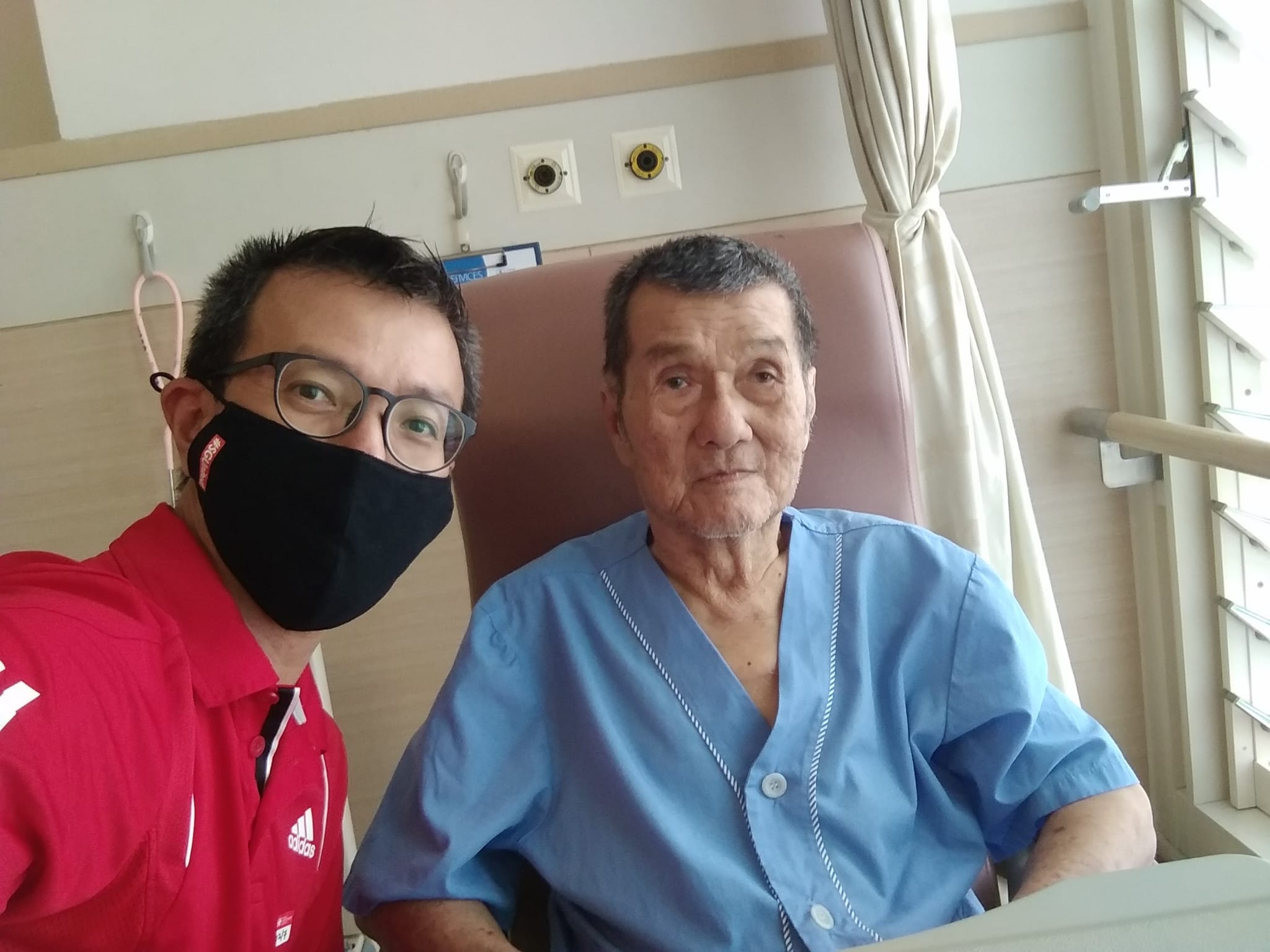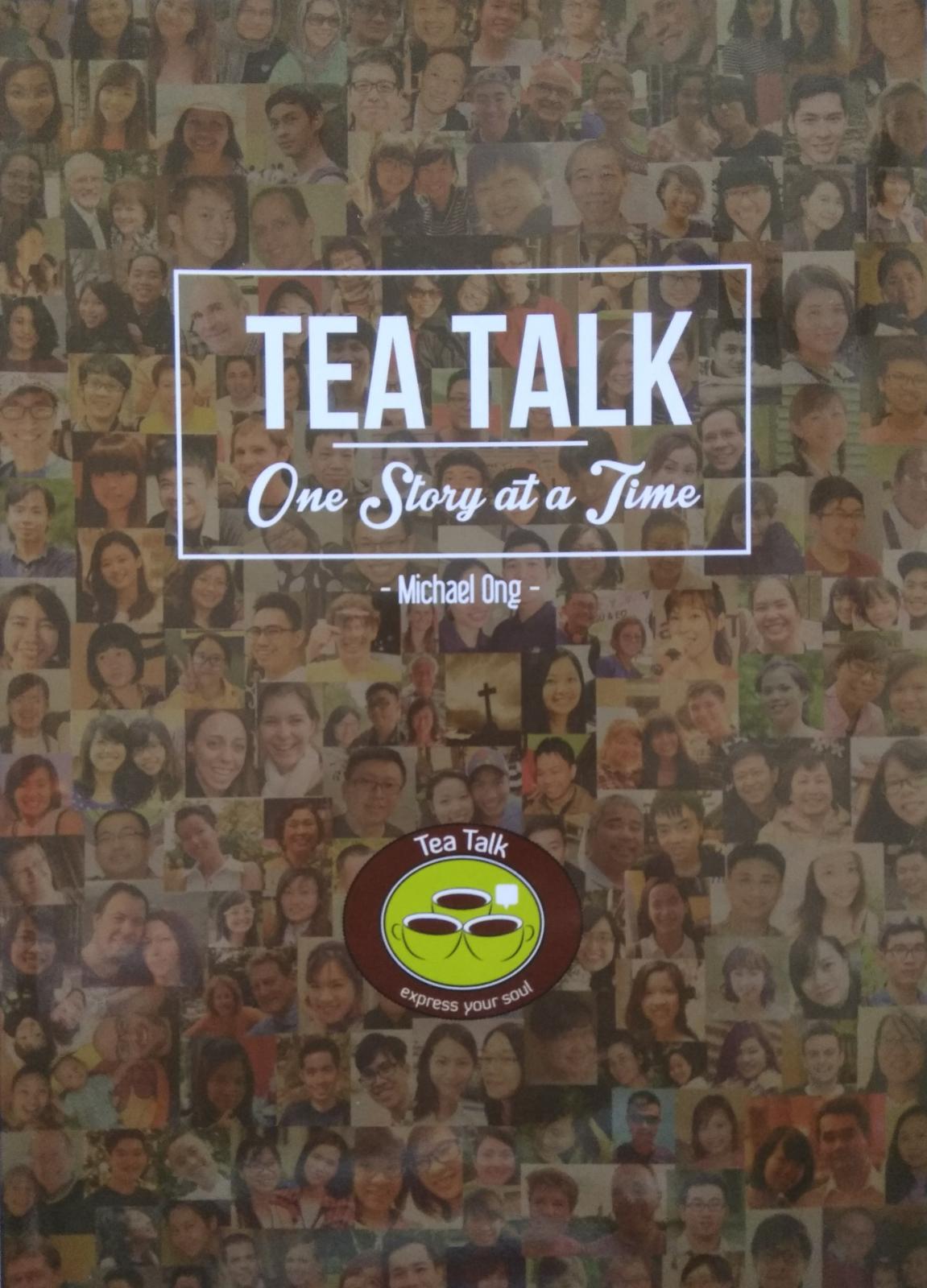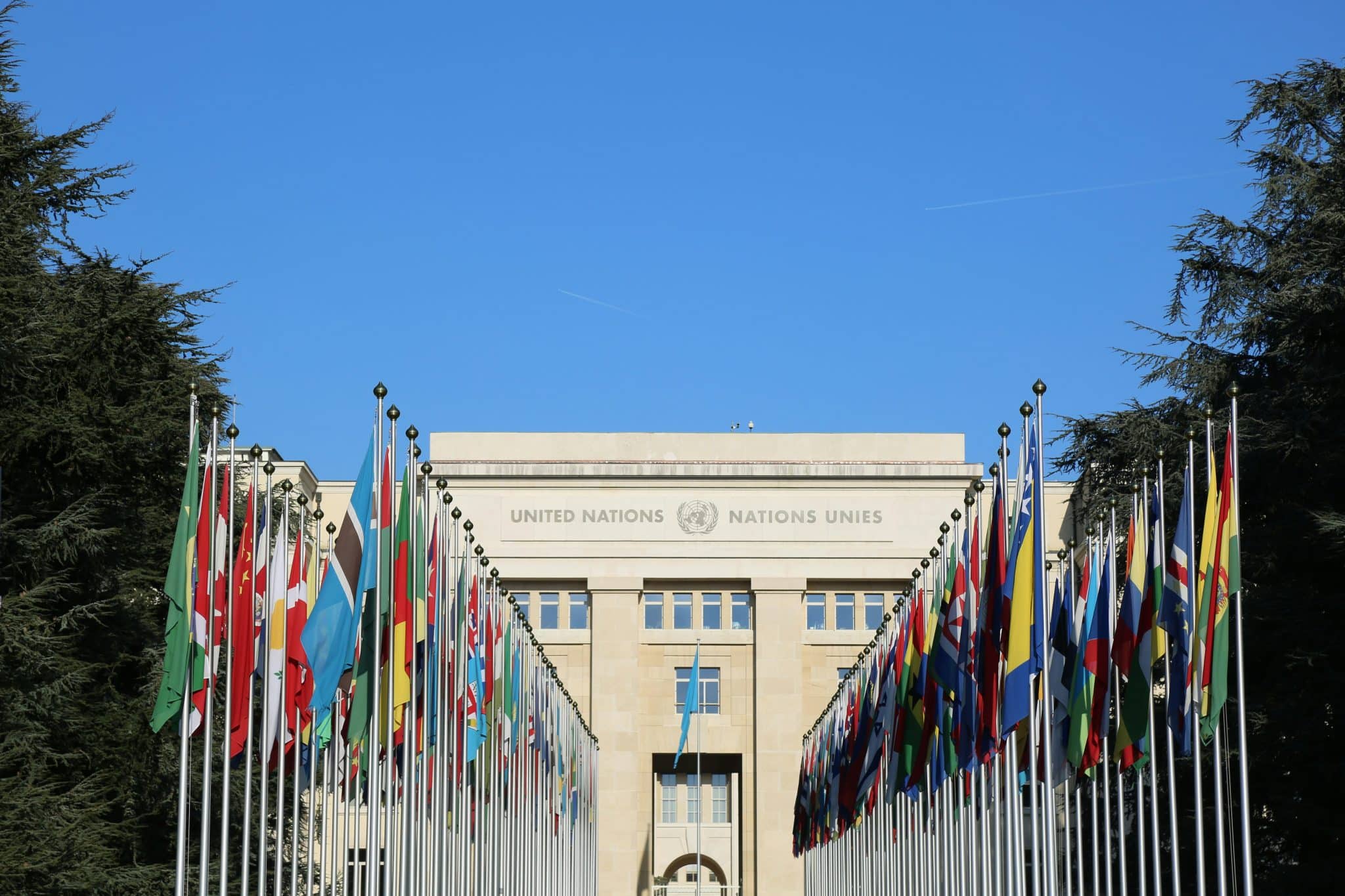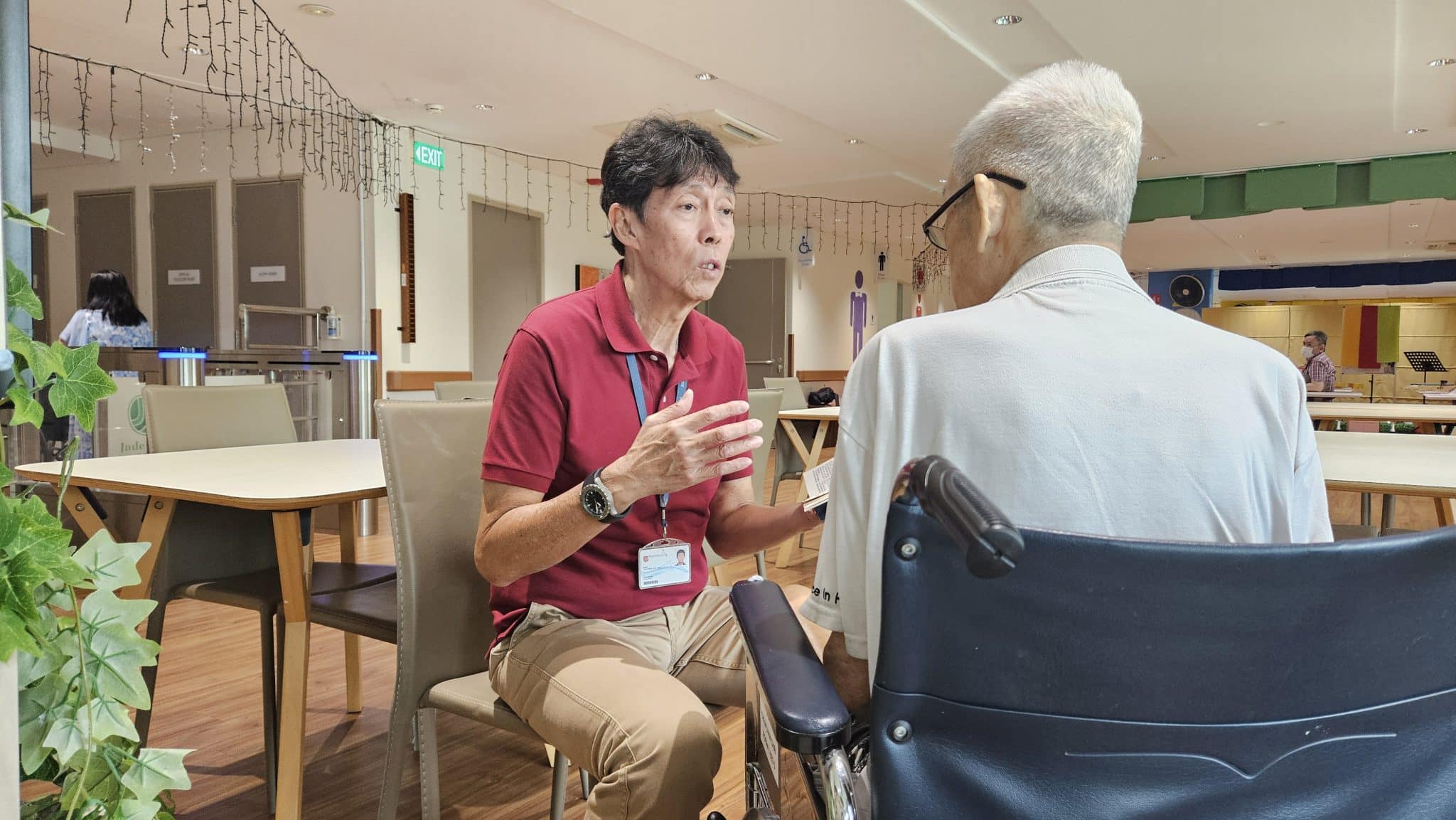
Michael, upon his arrival from Vietnam, visiting his father in hospital after his SHN ended. All photos courtesy of Michael Ong.
Diaper changing time. Meal time. Milk time. Shower time. No, this is not about parenthood. For me, that was 23 years ago.
I am talking about caring for my 88-year-old Dad.
Two months ago, my wife Jacqueline and I returned from Vietnam to Singapore with a single focus: To care for my Dad whose health is failing. It was only a few weeks ago that I had to be fully responsible for my Dad’s care for the first time.
Dad is like a four-month-old baby. He eats, sleeps and poops. I have to undress him. Change his diapers. Shower him. Then powder him. Moisturise him. Check his vital signs. BP. Temperature. Pulse. Record it down. Give him his medicine. The rest of the day is the “same old thing” – checking on his BP, temperature, and so forth. More medication. Even more diaper change.
I was drenched with sweat after the morning routine. I put Dad back on his bed. I had to take a shower myself. In the shower, strange and conflicting emotions and thoughts surfaced in the privacy of the bathroom.
A dad with dementia
Caregiving is a privilege. However, it is also a difficult one.
It is difficult because it is physically taxing. Regular diaper change, daily shower and feeding can take a huge toil. After all, he is not a 5kg baby. He is a 50kg non-ambulant adult, totally dependent for all his survival needs.
A baby would cry when hungry or sick, but my Dad with dementia does not. I wake him up, otherwise he sleeps all day. I feed him, otherwise he will not eat. I change his soiled diapers otherwise he sits in them the whole day.
A difficult privilege indeed.
He is not a 5kg baby. He is a 50kg non-ambulant adult, totally dependent for all his survival needs.
It is difficult because it is financially draining. Medical appointments, occupational therapy and physical therapy sessions. Transportation. Medicine.
He is 88 and, thanks to the Government’s subsidies, we pay a fraction of the cost.
Still, there are diapers to buy, the liquid thickener and the Rivastigmine patch to purchase. While waiting for some long-term care solutions, we engaged an interim caregiver. All these costs add up quickly.
Dad does not have much savings. As a taxi driver, he spent most of his productive days chauffeuring his children, his daughters-in-law and grandchildren to work or to school. So Dad did not earn much nor save much. Thankfully he has many children. Each of us pitch in financially.
Still, a difficult privilege.
When doubt creeps in
Caregiving is mentally tiring. Every day is not the same. There are financial spreadsheets to update, phone calls to arrange for his physical therapy appointment, then to cancel because he is suddenly warded in the hospital for dangerously low potassium level.
Upon discharge, a call to the Day Rehabilitation Centre to arrange for his next physical therapy. “Do I have to cancel again should Dad be admitted again?” It is mentally draining with so many details to coordinate.
A privilege? I begin to doubt.
Caregiving is emotionally overwhelming. I am prepared for the physical, financial and mental strain. But I was totally unprepared for the emotional roller coaster that comes with caregiving.
I am feeling melancholic as I sit with my Dad, listening to 97.2 FM. The Chinese songs soothe my weary heart.
Childhood memories, or the lack of them, surfaced while caring for him. I have never touched my Dad in such intimate ways. Where was Dad when I was a 4-month-old baby. Did he have to change diapers for me? No, he did not. There were no such conveniences as diapers in the early ’70s.
Actually, Dad was never around. I knew this from stories Mum relates to me surrounding my birth. True or not? I really do not know. Mum told me that Dad was not around on the day I was born and that he could not be reached or be found.
Mum is still very wounded, from the tone of her voice as she recalls that day with tears. It was five decades ago.
I can understand. Can you imagine your husband not being by your side when you gave birth? Mum told me that it was about a week later that Dad showed up.
My mind continued to spin in the shower. Was he surprised that I was born? Did he carry me and look at me with pride and joy? My son! Or was I a burden? Another mouth to feed on top of six others, all below 13 years of age.
Mum was 32 and was already the mother of seven children. What must have gone through their minds? Were they overwhelmed? Stressed? Helpless? Despondent?
I am feeling melancholic as I sit with my Dad, listening to 97.2 FM. The Chinese songs soothe my weary heart. Dad’s eyes are closed; he is seated on his wheelchair with his bruised hands (after having his blood drawn), holding on to the yellow stretch band my sister has bought for him to exercise.
Dad, who looks a quarter awake and three-quarters asleep on his wheelchair. I want to assume that he is enjoying the music. Is it a better quality of life?
A prayer for exhausted caregivers
“I am exhausted,” I text my sister.
Half joking and half encouraging, she replies: “It’s not even a month and you are exhausted already. LoL.”
Compassion and filial piety quickly give way to self-pity.
I am not expecting that. I do not doubt her intention for she has a huge load herself to carry. My sister often has migraines from overworking herself with worries and caring for Dad. I know her heart is pure.
In moments like these, silence may serve as a better encouragement than words.
But in this Whatsapp era, one is compelled to “text something” for not wanting to sound rude. So I understand her intent of that text when I tell her that I am exhausted. But I cannot help but feel unsupported.
Caregiving, unexpectedly, is an emotional experience. I certainly did not know that it would hit me that way. Maybe it hits you too. Maybe in many ways similar to mine.
Compassion and filial piety quickly give way to self-pity.
But why do I do it? Simply because it is a real privilege, indeed.
Who bears with Dad when it takes 20 minutes just to try to feed him four spoonfuls of water to keep him hydrated? Where were you when I had to clean up all the poop? Self-pity then transforms into self-righteous thoughts.
Suddenly, anger creeps up and takes hold of my heart. Come clean up poop before you tell me to weigh him regularly! Now I have to clean up all the shit, including the bedsheet! You have no bandwidth! And I do?
Guilt quickly swells up. The truth is, all my siblings have done many things for Dad without anyone’s knowledge. They must have felt the way I do. I feel bad for having such thoughts.
But I cannot help feeling overwhelmed and unsupported. Mad and angry with my siblings. Then mad and angry with myself for being mad and angry with them.
Then feeling guilty. Why do I have these selfish and angry thoughts? Why can’t I be more patient and understanding, knowing that my siblings have their own load to carry too? That they really have no bandwidth. That all the suggestions to better care for my Dad is simply because they do care. Nonetheless, it is exhausting!

Dad at home.
Caregiving is a privilege. And a very lonely and difficult one.
But why do I do it? Simply because it is a real privilege, indeed.
To all caregivers, whether it is for your elderly parents, or a disabled spouse, a mentally challenged sibling, or a handful of troublesome toddlers, whether you feel called to serve or the need to serve fell on your lap, this is my prayer for you as I pray for myself:
“It is with this in mind, I constantly pray for you, that our God may make you worthy of His calling, and that by God’s power He may bring to fruition your every desire for goodness and your every deed prompted by faith.” (2 Thessalonians 1:11)

To find out more about Michael Ong and his journey of care for the people God has put in his path, you can purchase his book: Tea Talk, One Story at a Time. The book, available in both English and Chinese, is an account of how Michael, a social worker from Singapore, set up social venture Tea Talk Cafe during his family’s 16 years in Vietnam, transforming many lives along the way. You can purchase the books here.
Salt&Light Family Night: How can we stay strong (and sane) caring for ageing parents and sick spouses?
There are an estimated over 200,000 caregivers in Singapore, looking after loved ones who are ill or dying.
Often a lonely, frustrating, 24/7 job, many caregivers suffer from physical, emotional and mental exhaustion that can lead to burnout and even depression.
What are the signs of caregiver stress? What can be done for caregivers? How can believers view this long-term challenge through the eyes of faith?
Join hosts Carol Loi and Alex Tee as well as these panellists as they tackle this difficult topic:
- Tim Lee, CEO of Caregivers Alliance Limited;
- Ps Alvin Ngo, retired pastor caring for his wife of 35 years who has Alzheimer’s Disease;
- Chia Yen-Yen, nurse who has spent nearly two decades caring first for her mother then for her husband, both of whom suffered strokes.
Date: September 28, 2021
Time: 8.30m-10pm
Cost: Free
Click here to register
RELATED STORIES:
“Nigel and Donavan, one day we’ll meet again,” say parents of boys in tragic Tampines accident
We are an independent, non-profit organisation that relies on the generosity of our readers, such as yourself, to continue serving the kingdom. Every dollar donated goes directly back into our editorial coverage.
Would you consider partnering with us in our kingdom work by supporting us financially, either as a one-off donation, or a recurring pledge?
Support Salt&Light



